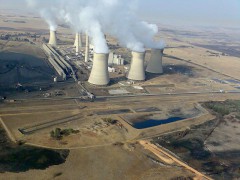Collaborating on Waste to Energy for Future Nigerian Cities

This article was originally drafted by the Centre for Democracy and Development for the newsletter “West Africa Insight” as part of the Rockefeller Foundation’s Searchlight Process. For more Searchlight content on futurechallenges.org, please click here.
As the population of Nigerian cities continues to soar, the problem of managing waste is at the fore of discussions in both public and private fora. Most of these discussions focus on how to effectively manage waste to curtail problems that may emanate, especially in respect of human health, the need to create energy from waste and provide for cleaner sources of energy.
Some months ago, the Nigerian Ministry of Environment and the Swedish Embassy in Abuja organised a workshop titled, “Sustainable City Development-Waste Management and Waste to Energy”. Participants at the workshop included government agencies, private companies and individuals working within the field and media organisations.
At the beginning of the workshop the Permanent Secretary in the Ministry of Environment, M.S. Bashar, said the event became necessary owing to the fact that Nigeria’s cities where growing and with it the problem of waste management and the need to seek alternative sources of cheaper and more environmentally friendly energy. The Swedish Ambassador, Par Lingarde, in his own remarks on the significance of the event for both parties stressed that in the recent past many Nigerian organisations (private and public) and individuals had expressed interest in waste management and the need to develop capacities to create energy from cleaner, cheaper and sustainable sources. In this light the Swedish Embassy felt obliged to share the Swedish experience with Nigerians.

Arnot Power Station in Middelburg, South Africa (by Gerhard Roux <gerhard@sundown.homeip.net> [GFDL (www.gnu.org/copyleft/fdl.html) or CC-BY-SA-3.0-2.5-2.0-1.0 (www.creativecommons.org/licenses/by-sa/3.0)], via Wikimedia Commons)
The event provided an opportunity for the Environment Ministry and its subordinate agencies to showcase efforts made to effectively manage waste in the major cities of the country. Papers presented dwelt on issues from policies made by the government, technologies currently in use and the need to search for and collaborate with other governments and organisations as a means of sharing experiences and information on expertise available. There were also presentations that threw light on the business opportunities that are available for organisations that want to work in the area. Discussions also focused on ways of financing initiatives within the sector and the need to put in place reforms that would adequately include waste as part of the energy reform mix in the country.
The workshop also brought to the fore the fact that an arrangement was in place to enhance the capacity of Nigerian students in the area of environmental management and technologies through exchange programmes that would make it possible for Nigerian students to study in Swedish universities. Participants applauded this initiative, which they felt would go a long way in providing the requisite knowledge to effectively engage the problem as the population of Nigeria’s cities continues to surge.
The participating Swedish companies and organisations including ABB, Biogas System AB Sunne, FOV Fabrics AB in Borås, University of Boras, and Stockholm Water all made presentations on various forms of technologies that could benefit Nigeria. For instance, FOV Fabrics AB made a presentation on an environmentally friendly biogas reactor for textile industries that could benefit textile manufacturers in Nigeria. Bio System AB Sunne made a presentation on biogas and its utilisation from an environment and energy perspective. In the presentation, they highlighted the benefits that Sweden as a nation has derived from the technology and how Nigeria can also benefit. Representatives of Stockholm Water made a presentation on other environment-friendly technologies that could be adopted in Nigeria.
The highlight on the second day was the visit to the Abuja Green which is currently being developed and would be built from scratch with environmental friendly materials. All the energy within the city would all be from alternative sources.
The collaboration between the Swedish Embassy and the Nigerian Ministry of Environment portends a great future for cities across Nigeria and West Africa in the light of growing populations and the consequent issue of waste disposal and the need to develop cleaner sources of energy.
